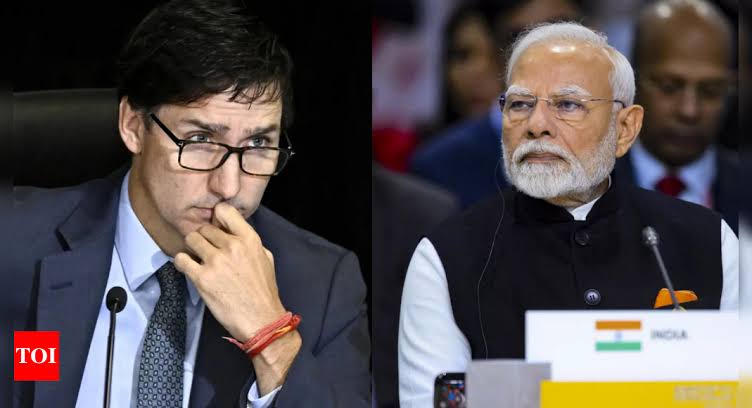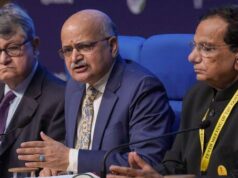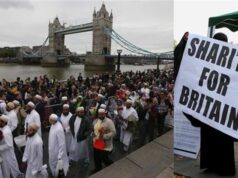Canada’s support for extremists undermines India relations

By Nandita Misra
India-Canada relations have deteriorated dramatically in recent times, with Canadian Prime Minister Justin Trudeau bearing the brunt of the blame.
The core of this diplomatic fallout revolves around Trudeau’s accusation that Indian agents were involved in the assassination of Canadian terrorist Hardeep Singh Nijjar, a known extremist declared a terrorist by India.
While this incident has become a flashpoint, it highlights Canada’s long-standing protection of individuals involved in anti-Indian activities, often under the guise of free speech.
Canadian terrorist Hardeep Singh Nijjar’s history exemplifies Canada’s lenient approach toward extremists. Since 1997, Nijjar sought Canadian citizenship based on forged documents, and after several rejections, he finally received it in 2007.
His association with terrorism is undeniable. India issued an Interpol red notice against him, placing him on the no-fly list and freezing his Canadian bank accounts.
His actions went beyond political dissent; he celebrated the assassinations of prominent Indian figures, including former Prime Minister Indira Gandhi and military officials.
His links to violent separatist movements and connections to Pakistan, where he was photographed holding an AK-47, only solidified his terrorist credentials.
For years, India repeatedly urged Canada to control the activities of terrorists like Nijjar who pose a direct threat to its national security. These individuals have actively campaigned for a separate Sikh state carved out of India’s Punjab region, organizing so-called referendums on Canadian soil.
Such actions go beyond free speech-they advocate violence, issue death threats against Indian officials, and incite hatred within India’s diaspora. Yet, Canada’s refusal to act has created fertile ground for terrorism to flourish.
In September 2023, Trudeau shocked the international community by accusing India of orchestrating Canadian terrorist Nijjar’s killing on Canadian soil.
However, Trudeau’s claims were based solely on “intelligence” without “hard evidentiary proof.” Even as India demanded concrete evidence, none was provided, leading to accusations that Trudeau’s statement was both reckless and politically motivated.
This diplomatic row escalated when Trudeau insisted that India should respect Canada’s sovereignty while allowing extremists to openly advocate India’s disintegration. His reasoning was baffling.
While he claimed that Canada opposes hate speech, his government has allowed extremist rhetoric that promotes violence against Indian officials, including Prime Minister Narendra Modi and the Indian ambassador to Canada.
To further complicate matters, during a parliamentary inquiry into foreign interference, Trudeau admitted that Canada had only “indications” of India’s involvement in Nijjar’s murder-still not the solid evidence that could justify such serious allegations.
In a bizarre turn of events, Trudeau even suggested that India should investigate its own security forces to find the evidence Canada lacked, an absurd request that only deepened the diplomatic rift.
While Trudeau’s government seeks cooperation from India, it has been remarkably uncooperative regarding India’s requests for action against extremists on Canadian soil.
India’s Ministry of External Affairs confirmed that Canada has ignored 26 extradition requests for individuals involved in promoting terrorism. Trudeau’s approach, characterized by a refusal to curb extremist activities within his borders, has jeopardized not only India-Canada relations but also Canada’s international standing.
At the center of this controversy lies Canada’s reliance on intelligence shared by the Five Eyes alliance-comprising the US, UK, Australia, New Zealand, and Canada.
Trudeau mentioned that the information implicating India came from Five Eyes sources and certain “South Asian” contacts, which India suspects may involve Sikh extremists with ties to Pakistan.
This reliance on vague intelligence without substantial proof further undermines Canada’s case.
The US has played a significant role in the unfolding saga. Top American officials, including Secretary of State Antony Blinken, have publicly supported Canada’s call for cooperation from India.
Yet, Washington’s actions reveal a glaring double standard. While US-India joint statements frequently emphasize cooperation against terrorism, the US has been slow to act against Sikh extremists operating within its borders.
Gurpatwant Singh Pannun, leader of the designated terrorist group Sikhs for Justice, continues to make open threats against Indian officials and institutions, yet remains shielded by US laws protecting free speech.
His organization, designated as a terrorist outfit by India, has called for attacks on the Indian Parliament and has incited bomb threats against Indian airlines.
Despite these provocations, the US government has taken no meaningful action against him.
This reluctance to act raises questions about the real motives behind the US and Canada’s inaction. Many in India believe that elements within the US “deep state” view Sikh extremists as a geopolitical tool to pressure India on various issues.
Canada’s close alignment with the US on this matter strengthens these suspicions.Justin Trudeau’s protection of Sikh extremists cannot be separated from his domestic political considerations.
The Sikh community in Canada is a significant electoral force, concentrated in key constituencies that have historically supported Trudeau’s Liberal Party.
His coalition government relied heavily on the support of Jagmeet Singh, leader of the New Democratic Party and a known sympathizer of the Khalistani cause, a separatist movement advocating for a Sikh state independent of India.
As Trudeau’s political fortunes wane and his government slips into minority status following Singh’s departure from the coalition, his dependence on the Sikh vote has only intensified.
With federal elections looming in 2024 and his approval ratings sinking, Trudeau is determined to maintain his support among Canadian Sikhs, even if it means shielding extremists. India has rightly criticized this electoral strategy as “vote bank politics,” accusing Trudeau of putting his political survival above Canada’s international responsibilities.
The breakdown in India-Canada relations has already begun to take a toll. Diplomatic expulsions, restrictions on consular services, and strained economic ties have followed in the wake of Trudeau’s allegations.
Canadian universities, which had attracted a large number of Indian students, are already seeing a decline in applications, as India discourages its citizens from pursuing education in Canada amid the hostile diplomatic climate.
While India has not yet taken significant retaliatory economic steps, its patience is wearing thin. Under previous Canadian administrations, relations with India had flourished, particularly during Conservative rule.
Should the Conservatives return to power after next year’s elections, there is hope that relations could be normalized. However, the toxic alliance between Sikh extremists and Trudeau’s Liberal Party has damaged trust, and any repair will be a slow and difficult process.
Canada’s unwillingness to confront violent extremism on its soil under the guise of protecting free speech is deeply concerning. By shielding individuals who openly advocate terrorism against India, Trudeau’s government has not only endangered diplomatic relations but also eroded Canada’s credibility on the global stage.
While Trudeau may be playing domestic politics to secure the Sikh vote, the long-term consequences of his actions are dire.
India, which has consistently sought cooperation on security matters, now views Canada as an unreliable partner, and relations may not recover until Canada takes meaningful action to curb the activities of extremists within its borders.




